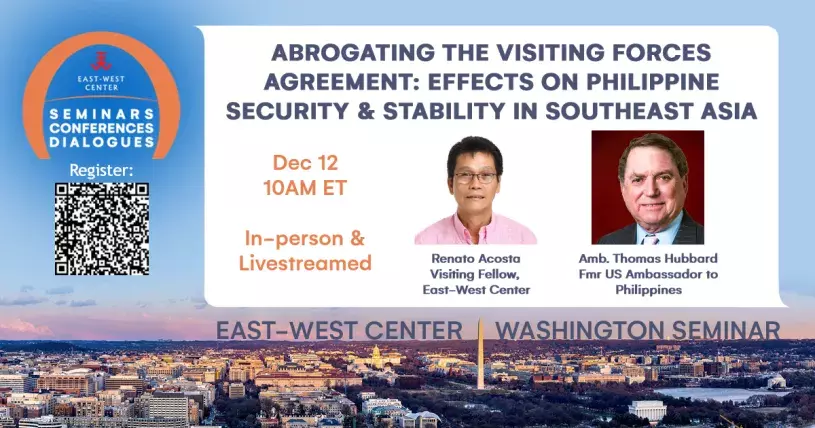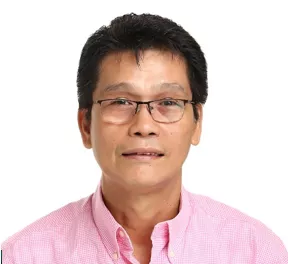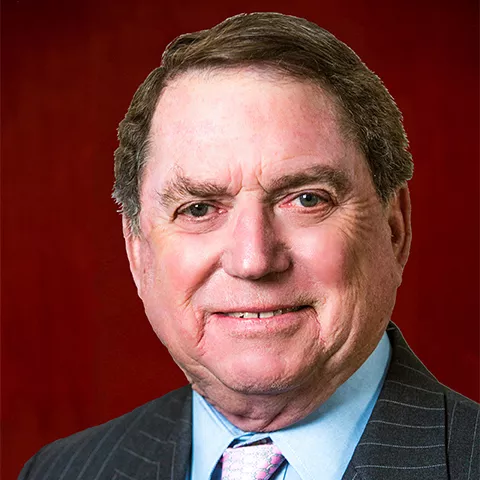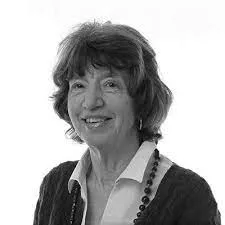Error message

OFFICE/DEPARTMENT
The East-West Center in Washington held an
Indo-Pacific Foreign Policy and Defense Series Seminar:
Abrogating the Visiting Forces Agreement: Its Effects on Philippine Security and Stability in Southeast Asia
A Conversation With:
Renato Acosta
Senior Reporter, BusinessMirror
U.S.-Philippines Alliance Fellow, East-West Center in Washington
Ambassador Thomas Hubbard
Senior Director, McLarty Associates
Former U.S. Ambassador to the Philippines
Dr. Ellen Frost (Moderator)
Senior Advisor and Fellow
East-West Center in Washington
Five years into the six-year term of former President Rodrigo “Digong” Duterte, the Philippines moved for the abrogation of its Visiting Forces Agreement (VFA) with the United States, shaking one of the very foundations of the U.S.-Philippines alliance. While the move has since been recalled, which fully reinstituted the security agreement, the “vicious” attempt by the former president to scuttle the VFA at the pretext of fully pursuing a Philippine independent foreign policy—while copiously swinging to China—engendered too many “ifs” and “buts” questions. In this seminar, Mr. Acosta discussed his research on possible outcomes if the Philippines were to follow through with abrogating the VFA. He suggested that not only could the Philippines lose the support of a major defense and security ally and impact its Mutual Defense Treaty with the U.S. government, but it could also, and more consequentially, tilt the regional status quo in favor of China, leaving the South China Sea to its domination and rendering Taiwan vulnerable to conquest.
SPEAKER BIOGRAPHIES

Renato Acosta is a reporter, writer, editor and author. A journalist for more than 30 years, Rene has written for a number of publications, both in the Philippines and abroad. His works have also appeared in the Center for Strategic and International Studies (CSIS), USNI News (US) and Oxford Analytica (UK). Currently, he works full-time as a senior reporter for BusinessMirror, a business newspaper in the Philippines where he covers defense and national security issues. His research topic during his residency with EWCW is "Abrogating the Visiting Forces Agreement: Its effects on Philippines’ security and stability in Southeast Asia".
He is also the author of The War on Terror: How the Philippine Military and the US Broke the Axis of Terror in the Philippines, a non-fiction book published by the Penguin Radom House Southeast Asia. The book was launched in November 2019 at the Singapore Writers Festival in Singapore, wherein he was also the “featured author” during the 10-day literary festival where he delivered lectures on three topics: The War on Terror, The Dark Side of Language and Subjectivity vs Objectivity. He is the author of the forthcoming book The War on Terror II. The non-fiction book is about the five-month war against the Islamic State of Iraq and Syria (ISIS) in Marawi City, Lanao del Sur in Mindanao in the Philippines in 2017, a campaign that was supported by the US government.

Ambassador Thomas Hubbard served as a career foreign service officer for nearly forty years, including as US Ambassador to the Republic of Korea from 2001 to 2004, and before that as Ambassador to the Philippines from 1996 to 2000. Earlier in his career, he served seven years in Japan and was Deputy Chief of Mission and acting Ambassador in Malaysia. He held key Washington postings, including Philippines Desk Officer, Country Director for Japan, and Principal Deputy Assistant Secretary for East Asian and Pacific affairs. A fluent Japanese speaker, he devoted half his career to Japan-US relations.
Increasingly involved in Korean Peninsular affairs in the 1990s, Ambassador Hubbard was a principal negotiator of the 1994 Agreed Framework aimed at ending North Korea’s nuclear weapons program, and headed the first senior level US government delegation to North Korea. He was also President Clinton’s envoy to promote human rights and democracy in Burma.
Ambassador Hubbard currently serves as the Chairman of The Korea Society in New York City and sits on numerous advisory boards. He received his BA in political science from the University of Alabama and has been awarded honorary doctorates by the University of Maryland and the University of Alabama.

Dr. Ellen Frost is a Senior Advisor and Fellow at the East-West Center. She writes and lectures frequently on Asia-related topics, especially Indo-Pacific political-economic issues and their strategic and security implications. She is the author of Asia’s New Regionalism, For Richer, For Poorer: The New U.S.-Japan Relationship, and Transatlantic Trade: A Strategic Agenda.
Dr. Frost previously served in the US government as Counselor to the US Trade Representative (1993–95), Deputy Assistant Secretary of Defense for International Economic and Technology Affairs (1977-81), various positions in the Treasury Department (1974–77) and the State Department (1963), and as a legislative assistant in the US Senate (1972–74).
Dr. Frost is a member of the Council on Foreign Relations, the International Institute of Strategic Studies, and the U.S. Committee of CSCAP (Council on Security Cooperation in Asia Pacific). She also serves on the board of Relief International, a non-profit international humanitarian and development organization. She received a Ph.D. from the Department of Government at Harvard University, an MA from the Fletcher School of Law and Diplomacy, and a BA from Radcliffe College, Harvard University.
The East-West Center in Washington held an
Indo-Pacific Foreign Policy and Defense Series Seminar:
Abrogating the Visiting Forces Agreement: Its Effects on Philippine Security and Stability in Southeast Asia
A Conversation With:
Renato Acosta
Senior Reporter, BusinessMirror
U.S.-Philippines Alliance Fellow, East-West Center in Washington
Ambassador Thomas Hubbard
Senior Director, McLarty Associates
Former U.S. Ambassador to the Philippines
Dr. Ellen Frost (Moderator)
Senior Advisor and Fellow
East-West Center in Washington
Five years into the six-year term of former President Rodrigo “Digong” Duterte, the Philippines moved for the abrogation of its Visiting Forces Agreement (VFA) with the United States, shaking one of the very foundations of the U.S.-Philippines alliance. While the move has since been recalled, which fully reinstituted the security agreement, the “vicious” attempt by the former president to scuttle the VFA at the pretext of fully pursuing a Philippine independent foreign policy—while copiously swinging to China—engendered too many “ifs” and “buts” questions. In this seminar, Mr. Acosta discussed his research on possible outcomes if the Philippines were to follow through with abrogating the VFA. He suggested that not only could the Philippines lose the support of a major defense and security ally and impact its Mutual Defense Treaty with the U.S. government, but it could also, and more consequentially, tilt the regional status quo in favor of China, leaving the South China Sea to its domination and rendering Taiwan vulnerable to conquest.
SPEAKER BIOGRAPHIES

Renato Acosta is a reporter, writer, editor and author. A journalist for more than 30 years, Rene has written for a number of publications, both in the Philippines and abroad. His works have also appeared in the Center for Strategic and International Studies (CSIS), USNI News (US) and Oxford Analytica (UK). Currently, he works full-time as a senior reporter for BusinessMirror, a business newspaper in the Philippines where he covers defense and national security issues. His research topic during his residency with EWCW is "Abrogating the Visiting Forces Agreement: Its effects on Philippines’ security and stability in Southeast Asia".
He is also the author of The War on Terror: How the Philippine Military and the US Broke the Axis of Terror in the Philippines, a non-fiction book published by the Penguin Radom House Southeast Asia. The book was launched in November 2019 at the Singapore Writers Festival in Singapore, wherein he was also the “featured author” during the 10-day literary festival where he delivered lectures on three topics: The War on Terror, The Dark Side of Language and Subjectivity vs Objectivity. He is the author of the forthcoming book The War on Terror II. The non-fiction book is about the five-month war against the Islamic State of Iraq and Syria (ISIS) in Marawi City, Lanao del Sur in Mindanao in the Philippines in 2017, a campaign that was supported by the US government.

Ambassador Thomas Hubbard served as a career foreign service officer for nearly forty years, including as US Ambassador to the Republic of Korea from 2001 to 2004, and before that as Ambassador to the Philippines from 1996 to 2000. Earlier in his career, he served seven years in Japan and was Deputy Chief of Mission and acting Ambassador in Malaysia. He held key Washington postings, including Philippines Desk Officer, Country Director for Japan, and Principal Deputy Assistant Secretary for East Asian and Pacific affairs. A fluent Japanese speaker, he devoted half his career to Japan-US relations.
Increasingly involved in Korean Peninsular affairs in the 1990s, Ambassador Hubbard was a principal negotiator of the 1994 Agreed Framework aimed at ending North Korea’s nuclear weapons program, and headed the first senior level US government delegation to North Korea. He was also President Clinton’s envoy to promote human rights and democracy in Burma.
Ambassador Hubbard currently serves as the Chairman of The Korea Society in New York City and sits on numerous advisory boards. He received his BA in political science from the University of Alabama and has been awarded honorary doctorates by the University of Maryland and the University of Alabama.

Dr. Ellen Frost is a Senior Advisor and Fellow at the East-West Center. She writes and lectures frequently on Asia-related topics, especially Indo-Pacific political-economic issues and their strategic and security implications. She is the author of Asia’s New Regionalism, For Richer, For Poorer: The New U.S.-Japan Relationship, and Transatlantic Trade: A Strategic Agenda.
Dr. Frost previously served in the US government as Counselor to the US Trade Representative (1993–95), Deputy Assistant Secretary of Defense for International Economic and Technology Affairs (1977-81), various positions in the Treasury Department (1974–77) and the State Department (1963), and as a legislative assistant in the US Senate (1972–74).
Dr. Frost is a member of the Council on Foreign Relations, the International Institute of Strategic Studies, and the U.S. Committee of CSCAP (Council on Security Cooperation in Asia Pacific). She also serves on the board of Relief International, a non-profit international humanitarian and development organization. She received a Ph.D. from the Department of Government at Harvard University, an MA from the Fletcher School of Law and Diplomacy, and a BA from Radcliffe College, Harvard University.













